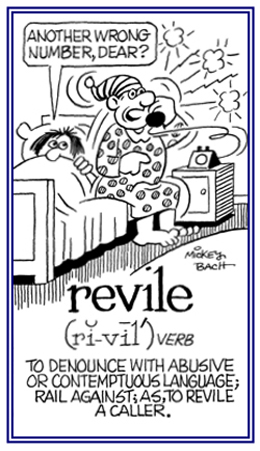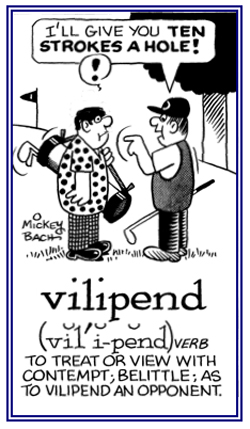vili-, vil-
(Latin: cheap, worthless, base, common; low status, low quality)
revile (verb), reviles; reviled; reviling
1. To speak to someone in a very critical or insulting way; to scold: Many people reviled the politician for his negative sanctions against other countries because they caused a significant loss in the values of the stock markets.

© ALL rights are reserved.
Go to this Word A Day Revisited Index
The company's decision to raise prices for its products reviles many customers to the extent that sales have decreased significantly.
2. Etymology: from French reviler, "despise"; from re-, "again" + vil, "vile" or "disgusting, worthless."
Go to this Word A Day Revisited Index
so you can see more of Mickey Bach's cartoons.
reviling
vile
vilificate
vilification
vilified
vilifier
vilifies
vilify
vilifying
vilipend (verb), vilipends; vilipended; vilipending
1. To treat another person with contempt as if he or she does not deserve any respect: Max feels that people vilipend him simply because he is a homeless person.
2. To disparage or to express negative opinions or comments about someone or something: When Jake was playing tennis, his opponent, Jack, was vilipending him as if he could never hit the ball back across the net.

© ALL rights are reserved.
Go to this Word A Day Revisited Index
2. To disparage or to express negative opinions or comments about someone or something: When Jake was playing tennis, his opponent, Jack, was vilipending him as if he could never hit the ball back across the net.

Go to this Word A Day Revisited Index
so you can see more of Mickey Bach's cartoons.
1. A statement or an act in which someone speaks contemptuously about a person or a situation or expresses strong disapproval of someone or what another one is doing or has done.
2. Etymology: from Old French vilipender; from Latin vilipendere, literally "to consider base"; from vilis, "cheap, base (without moral principles)".
2. Etymology: from Old French vilipender; from Latin vilipendere, literally "to consider base"; from vilis, "cheap, base (without moral principles)".
A person who says abusive or derogatory things about another person or certain situations or things.
vility
<img src="/img/left_arrow_sm.gif" alt="" /> <img src="/img/right_arrow_sm.gif" alt="" />
Showing 1 page of 14 main-word entries or main-word-entry groups.
